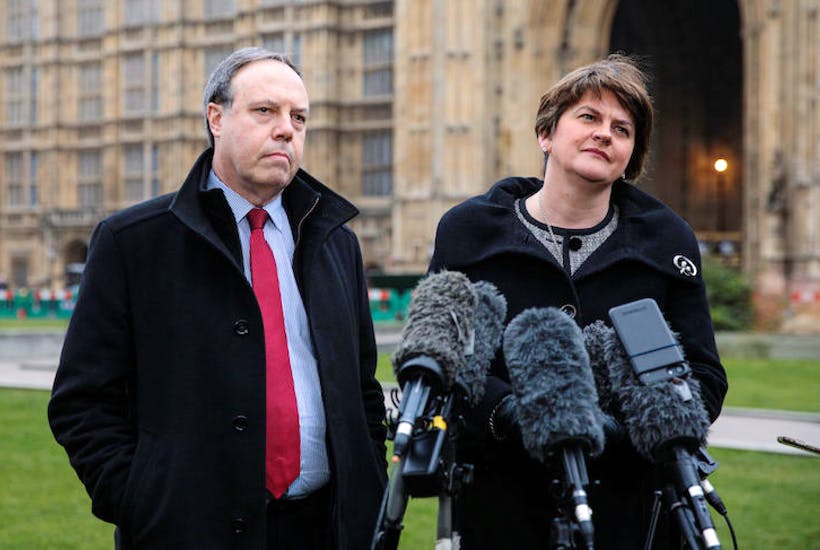For the third time, the UK government finds itself at odds with its allies, Northern Ireland’s Democratic Unionist Party. The DUP chose to vote against Boris Johnson’s deal on Saturday by supporting the Letwin amendment. They will surely do so again when the meaningful vote is finally taken this week.
But this time there is less DUP animus against the government because relations between the DUP parliamentary group and the PM have been generally good. The Prime Minister spoke at last year’s DUP annual conference and was well received. Even though his promises at that conference are regarded by the DUP as having been broken, there can be no doubt of the strength of Boris’s Johnson’s sincere unionism. He has also consulted the DUP at every turn, ably assisted by his foreign policy advisers.
There has been no repeat of the farcical situation of December 2017 when Theresa May agreed with Brussels a first draft of her withdrawal proposals but gave no sight of the document to the DUP allies on which her government depended. She had to abandon a lunch with Jean-Claude Juncker in Brussels, when the DUP finally saw the text and she returned to London for a further week’s revisions to the so-called Progress Report. This time relations between the PM and DUP are more cordial, but DUP opposition to the deal nonetheless remains total.
The DUP aim has ostensibly been to achieve a UK Brexit with Northern Ireland treated the same as Great Britain. In fact, their objectives have been more complex, and they have accepted a considerable degree of special treatment. From the start, local disquiet about the possibility of checks and delays for individuals at the Irish land border included many of the DUP’s own supporters, who feared problems in getting their flights from Dublin airport to Marbella and points east. Once it became clear that the Common Travel Area meant no checks on individuals, the pressure moved instead to business which has been uneasy about Brexit and uniformly opposed to a no deal Brexit with tariffs and regulatory checks at the land border.
As a responsible party, normally in government, the DUP have taken business concerns seriously and they moved a long way from their core objectives by accepting that Northern Ireland remain within the EU’s regulatory regime and essentially within the single market. This removed the need for regulatory checks at the Irish land border but crucially did mean checks at the Irish sea on goods coming into Northern Ireland from Great Britain. Some checks on animals and even agricultural machinery (for instance to check for accidental imports of soil on wheels) already exist and the DUP were reasonably relaxed on extending checks to a wider range of foods. Under pressure to give ground, the DUP eventually conceded checks on all goods coming into Northern Ireland.
This rather large concession was immediately banked by the EU which demanded more. The EU’s core aim was to protect its single market from unchecked goods entering the EU across the complex and unpoliced Irish land border, although safeguarding peace and the Good Friday Agreement were frequently included to bulk up its case. Its preferred means of achieving its aims were for Northern Ireland to remain within both its customs union and single markets as the rest of the UK departed.
Theresa May’s attempts to achieve this through a Withdrawal Agreement keeping the whole UK within the customs union and single market famously failed three times in Parliament. The EU then returned to its first preference of a Northern Ireland-only backstop. This meant not only regulatory conformity for Northern Ireland but also no tariff border between Northern Ireland and the Republic of Ireland. In other words, the entire EU border for regulations and tariffs would be located in the Irish Sea. Northern Ireland would be firmly within the EU’s commercial orbit, treated very differently from the rest of the UK. In this sense it could be perceived as a semi-detached part of the UK moving it a step nearer to the Irish nationalist goal of a united Ireland.
To secure an orderly exit at Halloween, the UK government conceded much of this but added a protective clause allowing the Northern Ireland Assembly a confirmatory vote four years into such a regime. The DUP has three main objections to the published deal. Firstly, although they may have agreed a similar deal with a confirmatory vote under the normal rules of the Good Friday Agreement, the published deal stipulated that such a vote be on a simple majority basis rather than on the GFA’s cross-community consent basis. Secondly, a tariff border within the UK between Northern Ireland and GB was a step too far. Thirdly, the Withdrawal Agreement’s insistence that Northern Ireland remain within the EU’s system for the administration of VAT provided yet another tear in the fabric of Northern Ireland’s place in the UK.
This rather long list of objections puts the DUP’s opposition to Boris Johnson’s deal apparently beyond recall. Their ten votes cast against the deal could well sink the agreement. Can a reconciliation be achieved?
In fact, the Withdrawal Agreement does less damage to Northern Ireland’s status within the UK as the DUP concerns might indicate. The DUP’s deepest concerns have been about their own ‘backstop’, the confirmatory vote, which would allow Northern Ireland to withdraw from the EU’s commercial orbit. On the face of it, a majority vote in a specially recalled Northern Ireland Assembly would allow nationalist parties, in combination with the strongly anti-Brexit Alliance party, to vote to continue the EU arrangements in perpetuity.
Lord Trimble, himself an architect of the Good Friday Agreement, argues reasonably that a simple majority vote of the type suggested is within the spirit of that Agreement. However, as a constitutional lawyer he is careful not to suggest that it reflects the letter of the GFA. The GFA clearly and repeatedly states that important decisions in Northern Ireland should be agreed by the consent of both nationalist and unionist groups within the Assembly. This is particularly the case for any cross-border activity and David Trimble as then leader of the main unionist party in 1998 took meticulous care in ensuring that the GFA prevented any drift towards Irish unity unapproved by unionists. He has written in the past that the British-Irish Governmental Agreement appended to the GFA supports a majority vote. However, the context here is clearly focussed on a vote on whether Northern Ireland should leave the UK and not more widely on issues such as commercial arrangements.
The DUP thus have a case that the new Withdrawal Agreement contravenes the letter of the Good Friday Agreement in its stipulation that any confirmatory vote should be decided by a simple majority. Nonetheless, Lord Trimble’s point about the spirit of the GFA will have wide resonance. While skipping between spirit and letter of an agreement as convenient is clearly unsatisfactory, many in Northern Ireland, including the majority of business opinion, will prefer a decision on commercial arrangements to be taken by a majority. It is far from certain the DUP would lose a confirmatory vote, which in any case would be taken between five and seven years in the future. The detachment of Northern Ireland commercial regulations from those in GB may well prove unpopular. If, for instance, GB embarks on a cheap food policy, allowing say hormone-treated Brazilian or American beef into GB but not NI, public opinion may demand a return to an all-UK framework.
The DUP’s second objection, to a tariff border at the Irish Sea, is also less important than it might seem at first sight. The wording of the backstop in the new Withdrawal Agreement is vague on what exactly would be checked. The proposal is that goods bound for the Republic of Ireland from GB via Northern Ireland would be liable for tariffs as they enter Northern Ireland. A new ‘Joint Committee’, set up within the Withdrawal Agreement to administer its provisions, would decide which types of trade were most likely to involve such through-trade.
It can be argued that the Joint Committee is itself a new institution governing Northern Ireland completely outside the GFA, thus adding to the democratic deficit created by imposing on NI commercial regulations which it has no say in agreeing. The danger for unionists is that when Northern Ireland businesses need to lobby for changes in regulation, they will need to work with MEPs elected in the Republic of Ireland. The focus of business will thus rotate away from London and towards Dublin in way that softens up Northern Ireland for an eventual Irish unification.
The point is that little trade may be liable for tariffs at the Irish sea and very little trade bound for Northern Ireland. While there is a capability within the new backstop for Northern Ireland firms to be charged tariffs, which can be remitted if the goods are consumed within Northern Ireland, such a complex mechanism is likely to be avoided in future negotiations. Think about supermarket trucks with hundreds of different items bound for Northern Ireland all due different tariffs and rebates. Since four times as much trade occurs between NI and GB as between NI and the Republic this could involve business in a much larger amount of administration than would be saved by avoiding a land border.
The outworking of these arrangements would surely minimise tariff liability at the Irish Sea into NI. Only those consignments bound for the Republic would be due to pay tariffs and the only checks needed would be intelligence-based to intercept smugglers. In any case, the intention is to negotiate a free-trade agreement during a transition period. With an FTA in place there may be no tariffs to impose and no need for any checks. In other words, we can expect the tariff border to dissolve by then end of the transition period.
The third DUP concern is on VAT. The Withdrawal Agreement states that Northern Ireland will remain within the administrative arrangements that currently cover the whole UK. This will facilitate the collection of VAT duties due of trade across the Irish land border. It does not mean however that Brussels, or anyone other than the UK Government, will set VAT rates or exemptions. Just as is currently the case within the entire UK, VAT rates will be set in London. Although clearly another case where Northern Ireland is treated differently from GB, this is a technical matter of tax administration and of little consequence for the future of the union. All taxes collected in Northern Ireland will be remitted to London and not Brussels or anywhere else.
In conclusion, the new Withdrawal Bill contains arrangements for Northern Ireland that the DUP find unacceptable. This is on the grounds that Northern Ireland is treated differently from Great Britain in a way which endangers what Conservatives often refer to as ‘our precious union’. Detailed examination however suggests that these dangers are more perceived than real. This is decidedly not a modern rerun of the Anglo-Irish Agreement of 1985. Tariff liability at Northern Ireland’s Irish Sea border are likely to fall away with the signing of a UK:EU free trade agreement. Regulatory alignment and the need for associated checks are also likely to be minimal since any modern free-trade agreement includes level playing-field provisions. The administration of VAT is a technical matter for firms and will hardly be noticed by the wider public. In short, there is little here that threatens the union and few threats that had not already been agreed by the DUP in consultation with the Johnson Government.
There remains a widespread resentment among unionists in Northern Ireland, and not only DUP supporters, that Northern Ireland cannot simply be treated like any other part of the UK. The presence of a substantial national minority within Northern Ireland and the history of violence have made it impossible for even pro-union Tory Governments to go as far as unionists would like. Nevertheless, Northern Ireland’s position within the union is secure. Authoritative polls put support for Irish Unification at only 20%, much the same as it has been for years. Even with its tax-haven status, now likely to come under threat form the EU, the Irish Republic’s living standards are no higher than in Northern Ireland (where corporation tax could now be reduced to a low level). A prosperous Northern Ireland with highly popular features like the NHS is unlikely ever to vote itself out of the UK. Although both the Northern Ireland civil service and local business have exaggerated the costs of no deal, there will be widespread relief in Northern Ireland if a deal is done.
Dr Graham Gudgin is Policy Exchange’s Chief Economic Adviser. He was Director of the Northern Ireland Economic Research Centre and a Special Adviser on Economics to the First Minister in the NI Assembly, David Trimble.
Got something to add? Join the discussion and comment below.
Get 10 issues for just $10
Subscribe to The Spectator Australia today for the next 10 magazine issues, plus full online access, for just $10.




















Comments
Don't miss out
Join the conversation with other Spectator Australia readers. Subscribe to leave a comment.
SUBSCRIBEAlready a subscriber? Log in